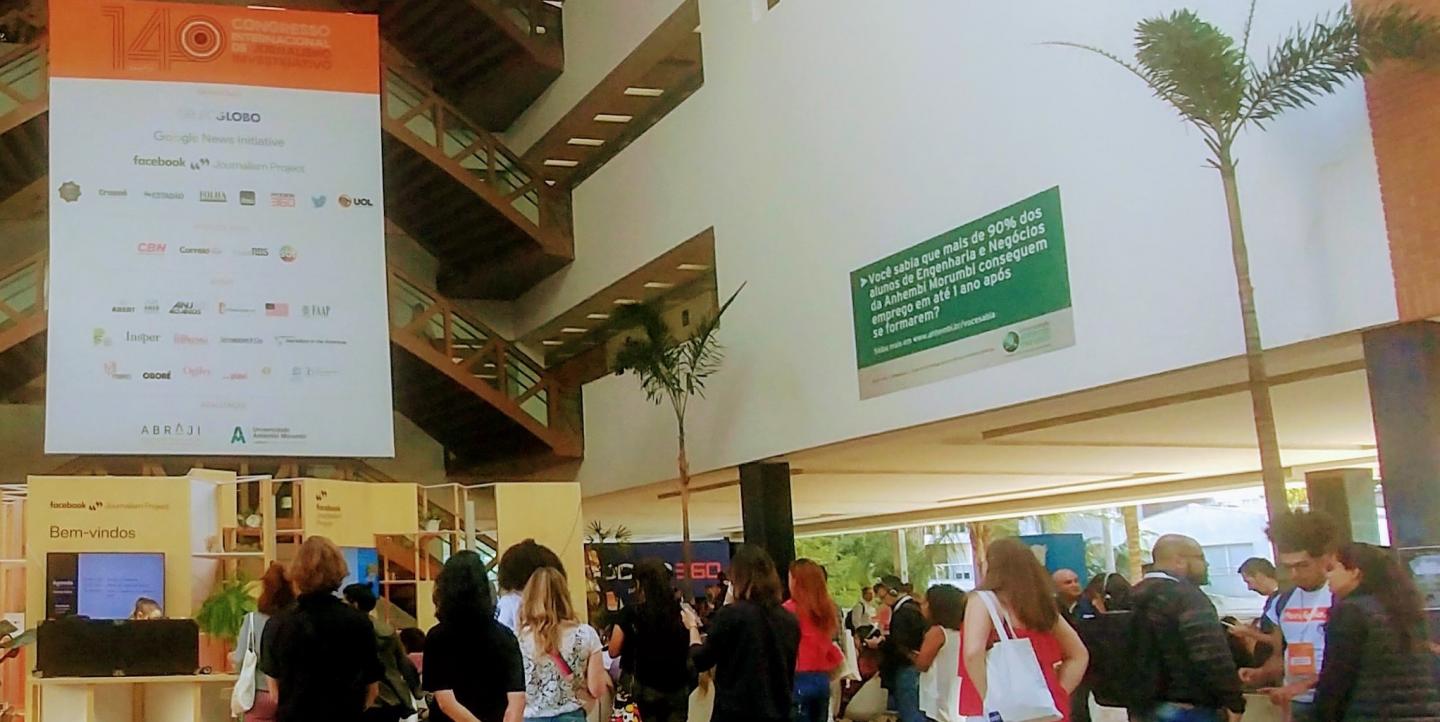Amidst intense political polarization, media layoffs and attacks on the press, the Brazilian Association of Investigative Journalism (Abraji) held the 14th International Conference of Investigative Journalism June 27 to 30 in São Paulo.
"The world is inflamed and when you throw more fuel on it, it only gets worse," said Cris Bartis, co-founder of the podcast Mamilos, during the panel "Covering politics without fomenting polarization." The way out, according to Bartis, is to focus the conversation on people. "We have to build bridges [among those who think differently], rather than prove points."
The question is how to do this in practice. In the case of Mamilos, the solution has been to invite people who think differently to discuss a variety of subjects face to face. At the end of each program, people realize there are more similarities than differences between them, Bartis said.
However, this is not the only way out. The way the public reacts to the press has changed. In the past, the interactions were manifested in objections, complaints and lawsuits, but today the reality is different. With the use of social media, the dissemination of news — whether true or not — is virtually immediate. And, while there is no weight or responsibility in doing so, access to technology has enabled everyone to communicate what they think.
In Brazil, there have been frequent cases in which journalists are attacked and have their private lives — and the lives of those close to them — exposed on social media. Last year, after publishing an article uncovering a WhatsApp campaign paid for by businessmen against the Workers' Party, Patrícia Campos Mello, a journalist at Folha de S. Paulo, had her cell phone hacked. Messages were sent from her phone in support of the then-presidential candidate, Jair Bolsonaro, and her life and her daughter's life were threatened. A veteran of armed conflict reporting, Campos Mello suddenly found herself accompanied by a security detail in the middle of São Paulo, which she recounted during the panel "Journalism under attack." In the same panel, journalist Constança Rezende spoke for the first time about the disinformation spread by the Brazilian president, accusing her of seeking to destroy him and his family.
According to Pierpaolo Bottini, coordinator of the Press Freedom Observatory of the Brazilian Bar Association (OAB), Brazilian criminal law is the solution to separate crime from harsh criticism against journalists. The lawyer argued that "reaction to these actions should be immediate." He also recommended victims to save screenshots of offenses and threats, notarize the record in a notary's office and make a complaint to the police and public prosecutors to initiate an inquiry.
Increasing distrust in the press
Bolsonaro's attacks on the press and journalists are commonplace. The president of Brazil has a strong media presence and has been spreading the idea that "the press lies."
"I do not agree with that [statement]. By generalizing, you end up creating turmoil," said retired general Carlos Alberto Santos Cruz, former minister-secretary at the Office of President Bolsonaro, in an open interview with journalists Julia Dualibi and Daniel Bramatti, on the first day of the conference. For Cruz, the use of the internet without accountability "creates chaos and hampers governability." Yet, he was reserved in criticisms of the Bolsonaro government.
During the panel "Press and Bolsonarism: the challenge of covering a government that stigmatizes journalism," Thaís Oyama, former journalist of Veja magazine, stated that the Bolsonaro administration favors those in the press it trusts. One example, cited by fellow panelist Nelson Sá, a journalist at Folha de S. Paulo, is the breakfast events held by the president with professionals who cover the government palace, which cannot be recorded or photographed.
"Bolsonaro has become smarter, more cunning; he doesn't miss the opportunity to smear, slander and offend. You know the impact that his popularity has," said Oyama.
Fernando Barros e Silva, editorial director of Piauí magazine and host of the podcast Foro de Teresina, argued that the current administration is characterized by resentment. And he warned: "We can't fall into the trap of treating the government the way it wants to be treated. The solution is serious journalism."
Barros e Silva also cited the recent investigation published by The Intercept Brazil, which revealed impropriety in the car wash corruption crusade — known as Lava Jato — that weakened the Worker's Party and created the conditions for the election of Bolsonaro.
The executive editor of The Intercept Brazil, Leandro Demori, agreed with Barros e Silva and stressed flaws in the way the Lava Jato was reported. "Without press coverage, the Lava Jato would not have happened," he said, stating that The Intercept Brazil's investigation should be an opportunity for media professionals to evaluate how they have been working in recent years.
The 14th International Conference of Investigative Journalism also addressed regional issues such as journalism in the Amazon and in conflict zones, collaborative journalism, new formats, data reporting, misinformation, fact-checking and more.
Read Abraji's highlights here (in Portuguese).
Main image of the Anhembi Morumbi University in São Paulo, where the Abraji Congress was held, courtesy of Kalinka Iaquinto

